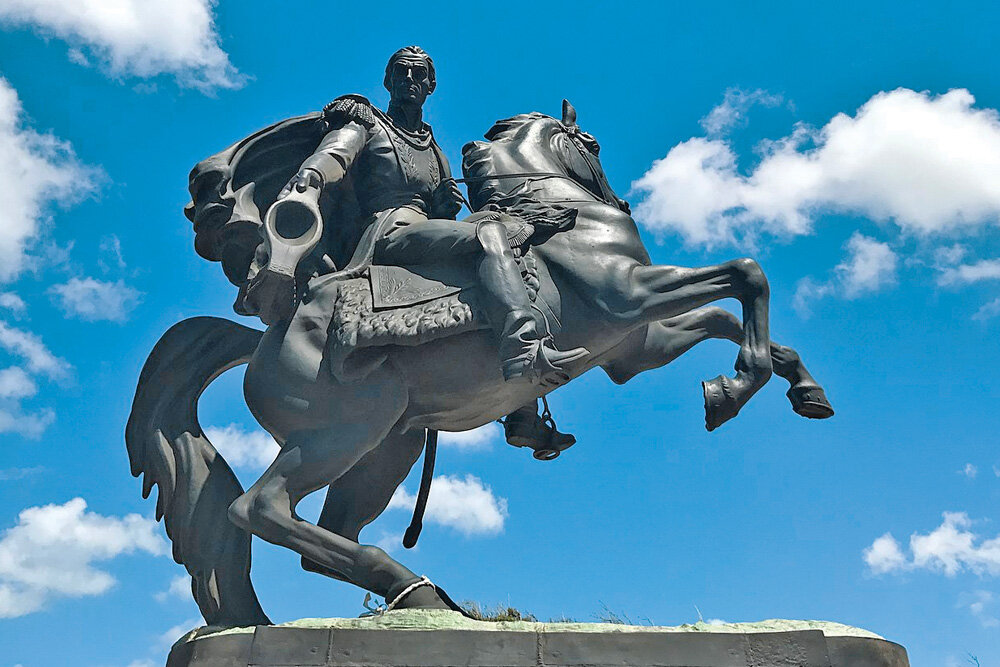Irán y Latinoamérica un mismo destino

TEHRAN – Iranian President Ebrahim Raisi left Tehran for Caracas in a tour of three Latin American countries on Monday morning. The visit is expected to boost Iran’s relations with Latin American countries.
In his tour, President Raisi is accompanied by a large politico-economic delegation that includes the ministers of defense, foreign affairs, petroleum, health, and culture.
On Monday evening, local time, President Raisi will be officially welcomed by his Venezuelan counterpart, Nicolas Maduro, at the Miraflores Palace in Caracas.
In addition to Venezuela, Raisi will also travel to Nicaragua and Cuba, where he will hold high-level meetings with the officials of these countries to move Iran-Latin America relations to the next level.
Iran has long been seeking to cement its ties with the countries in Latin America, which share great political and economic commonalities with Iran. At least since the late 2000s, Iran has been working to upgrade ties with the countries of this region, particularly Venezuela.
Great strides have been made towards achieving strategic relations with Latin America. For instance, Iran-Venezuela relations have already been upgraded to a strategic level, with economic interactions between the two sides are steadily rising.
Before his departure, President Raisi was keen to underline the visit’s objective of upgrading the level of relations between Iran and Latin America to a strategic level.
The president described the relations between Iran and the independent countries in Latin America as strategic. “The common positions of the Islamic Republic of Iran and the three countries of Venezuela, Nicaragua and Cuba is to stand against the domination system and confront unilateralism,” he said, according to readout by the official website of the Iranian presidency.
Iran’s strong desire to cement relations with some of the countries of Latin America can be put in the context of the Raisi administration’s balanced foreign policy agenda and the great commonalities that bond Iran to the independent countries of Latin America.
Iran first earnestly moved to strengthen relations with Latin America in the late 2000s. And many high-level visits were exchanged between the two sides. But a political interregnum lowered the pace of development of relations between the two sides from 2013 to 2021.
The election of Ebrahim Raisi, however, gave new momentum to Iran-Latin America relations. Right from the start, the Raisi administration introduced the policy of neighborhood, which aims to improve Iran’s relations with non-Western powers in addition to Iran’s neighbors.
Under this policy, the Raisi administration first prioritized enhancement of Iran’s relations with neighboring and Eastern countries, making several strides in the process. Under Raisi, Iran’s membership in the Shanghai Cooperation Organization was finalized. Also, relations between Iran and Saudi Arabia were restored after seven years. Most recently, the Raisi administration had its eyes set on BRICS.
With Iran improving ties in all directions, now it seems that it’s Latin America’s turn.
Iran shares great political views with Venezuela, Cuba and Nicaragua. In terms of economy, the sides’ economies are also complementary. These things can serve strengthen relations between Iran and Latin America.
Like Iran, several Latin American countries have been subject to U.S. coercive measures.
President Raisi lauded the spirit of freedom-seeking among Latin American countries. “Today, most of the countries in the Latin American region want to live independently, and the spirit of freedom-seeking, independence and resistance against the domination system is common among the countries that have good relations with Iran,” he said.
Raisi said Iran had good relations with Venezuela, Cuba, and Nicaragua in the past years. “Iran, in addition to friendly political, economic and commercial relations with Venezuela, Nicaragua and Cuba, has also had good cooperation with these countries in the field of energy,” he added.
The president continued, “In the last two years, interactions in the fields of industry, agriculture, science and technology and medicine have also developed favorably.”
He noted, “These countries, and of course the neighboring countries and other countries that are friendly and aligned with Iran, have always expressed interest in taking advantage of Iran's capabilities in the field of technology and engineering.”
He stated, “There are good capacities in the Islamic Republic of Iran, thanks to the Islamic Revolution and the people, whose exchange can help expand and strengthen relations and cooperation with the countries of the Latin American region and other neighboring countries, and strengthen international interactions between these countries.”
The visit by Raisi to Latin America is expected to further enhance these relations at a time when the U.S. is declining globally and independent countries like Iran are rising. Also, these relations are of importance in terms of their impact on the emerging new world order. If combined, rising countries can contribute to shaping a better and fairer world order.
Leave a Comment